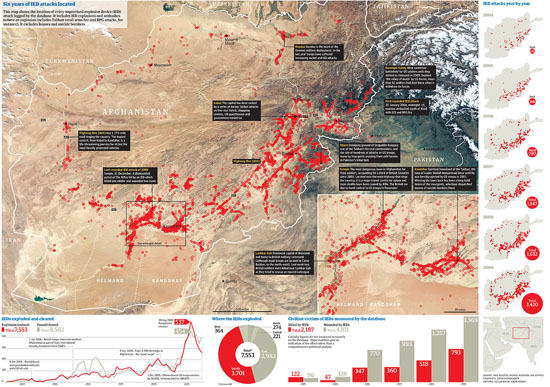Image: The Wikileaks War Logs (The Guardian)
Data-driven Journalism is grounded in calls for open access to information and transparency and has strong links government related open data initiatives, making public data available in standardised and open formats. It aims at the process of filtering data and telling new and interesting stories with conditioned data sets rather than just using the data as a source.
The most prominent example of data-driven journalism is the case of The Guardian and Wikileaks, where data has been transformed into interactive visualisations to allow a exploration of the data by the user itself.
It is clear by the amount of data alone, that these interactive visualisations can not be created manually. They need to be created with designers and developers working hand in hand, automating data processing and filtering to allow for the story to be explored by the user. This is a complete game changer for most news publishing corporations who traditionally had only journalists and maybe illustrators or photographers telling stories.
Ever since data-driven journalism became a mainstream element for many major stories, the newsroom process became much more technical and complex. This has also risen the cost for the newsroom staff to create the content for the publisher’s website. Since developers are in high demand all around the world, it is safe to assume that the costs for publisher’s grew substantially in this regard.
Considering the difficulties most publishers have to monetise their digital efforts successfully, it is doubtful that expensive data-driven stories will be able to compensate for that. As desirable as great stories such as the Wikileaks example might be, it is hard to find evidence that it is helping publishing companies to find new and working business models on the internet.
DISCLAIMER: This post has been written for the seminar “Online and Mobile Media” during an international research exchange at the University of New South Wales (UNSW) in Sydney, Australia, within the “Next Media” master program at the University of Applied Sciences Hamburg (HAW Hamburg) in 2016. For more information or any questions please contact me at mail@moritzrecke.com.

